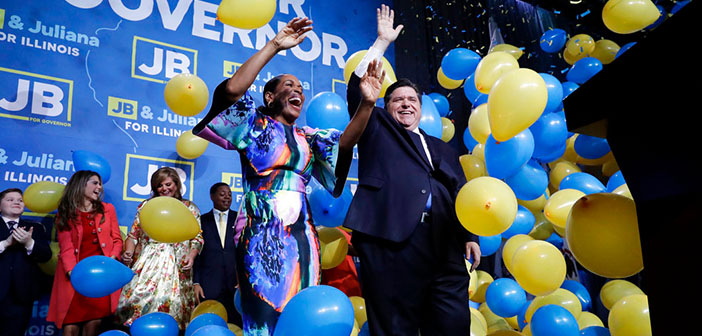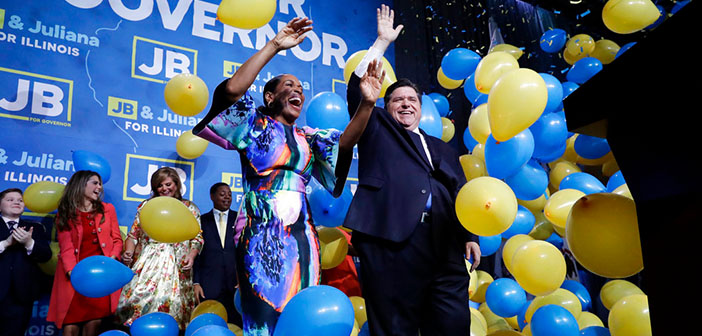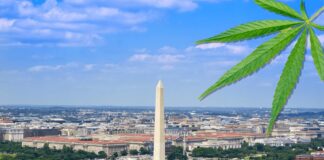
By David A. Lieb and Geoff Mulvhill, The Associated Press
From New York to New Mexico, residents in a number of states can expect a leftward push for expanded health-care coverage, gun control, education funding and legalized recreational marijuana as Democrats who gained new or stronger powers in the midterm elections seek to put their stamp on public policy.
While Republicans remain in charge in more states, Democrats nearly doubled the number of places where they will wield a trifecta of power over the governor’s office and both chambers of statehouses. Democrats also broke up several Republican strongholds, forcing GOP lawmakers who have been cutting taxes and curbing union powers to deal with a new reality of a Democratic governor.
All told, Democrats gained seats in 62 of the 99 state legislative chambers, according to data provided by the National Conference of State Legislatures. Nebraska is the lone state with a single, or unicameral, legislative body. Democrats also added seven new governorships.
In New York, where a new Democratic-run Senate will provide the missing link in liberals’ political power, the expansive agenda could go beyond guns, cannabis and health-care to also include more protections for abortion rights and higher taxes on millionaires.
“We will finally give New Yorkers the progressive leadership they have been demanding,” said state Sen. Andrea Stewart-Cousins, who stands to lead the Senate when the new session begins in January 2019.
Divided We Stand
The U.S. is a deeply divided nation politically, a fact reflected in a midterm vote that gave Democrats the U.S. House while adding to the Republican majority in the U.S. Senate. But within states, the overall outcome of the 2018 elections was a continued trend of one-party control — Democrats in some places, Republicans in others.
For the first time since 1914, there will be only one state — Minnesota — with its two legislative chambers led by different parties.
If Republican gubernatorial candidates maintain their slim leads in Florida and Georgia, Republicans will hold full control over the governor’s office and legislative chambers in 22 states, compared with 14 for Democrats. Just 13 states will have a split partisan control between the governor’s office and legislature, nearly matching the 60-year low point set in 2012.
There also has been a decrease in ticket-splitting between governors and state attorneys general, with the number of such divisions expected to decline from 12 to 10 as a result of the elections Nov. 6, 2018.
“This is the most hyper-polarized, hyper-partisan time we’ve see in generations, and nobody can deny that,” said Illinois state Sen. Toi Hutchinson, a Democrat who is president of the National Conference of State Legislatures.
Legal Marijuana in Illinois?
Illinois is one of a half-dozen states where the Nov. 6 election put Democrats in control of the governor’s office and legislature.
Democrat J.B. Pritzker, who ousted Republican Gov. Bruce Rauner, wants to legalize and tax recreational cannabis. Michigan became the first state in the Midwest to permit recreational marijuana, joining nine other states and Washington, D.C., in allowing legalized adult-use cannabis.
Pritzker also has promised to push for a constitutional amendment to replace Illinois’ flat income tax system with a progressive one that requires the wealthy to pay a greater share.
Reform on the Agenda in New Mexico
Meanwhile in New Mexico, Democratic Senate Majority Leader Peter Wirth said minimum wage and teacher pay increases will be at the top of the agenda. Democrats also could overhaul the state’s approach to climate change, gun control, and marijuana.
The states shifting to Democratic dominance can look to New Jersey, which held its governor’s election in 2017 and replaced Republican Chris Christie with Democrat Phil Murphy. With the Legislature already controlled by Democrats, the state promptly tightened gun regulations, passed a paid sick-leave requirement and restored funding to Planned Parenthood.
But it hasn’t been like Christmas every day for liberals. It took a last-day deal before the budget expired over the summer to avoid a state government shutdown as Democrats disagreed over which taxes to raise. Lawmakers have missed their own deadlines on legalizing cannabis for adults, and some advocates are upset the state has not moved faster to boost the minimum wage.
Democratic New Jersey state Sen. Loretta Weinberg, who has been in the legislature since 1992, said there’s a big difference in legislative debates when there’s one-party control.
“It is more about details than the broader principles,” she said.
Some states that became accustomed to Republican control over the past decade also will be making adjustments.
In Wisconsin, Republican lawmakers have been privately discussing ways they could limit the rule-making powers of Democratic Gov.-elect Tony Evers, who narrowly defeated Republican Gov. Scott Walker. Republican Senate Majority Leader Scott Fitzgerald said they are looking at reconstituting boards to make sure they have equal representation.
North Carolina’s Republican-led Legislature did something similar after Democrat Roy Cooper won the governor’s race in 2016. But Cooper successfully sued over a law weakening his influence over the state elections board.In addition to Evers winning the governorship, several Wisconsin counties posed non-binding advisory questions before voters to gauge sentiment for legalizing medical marijuana. The advisory questions passed.











